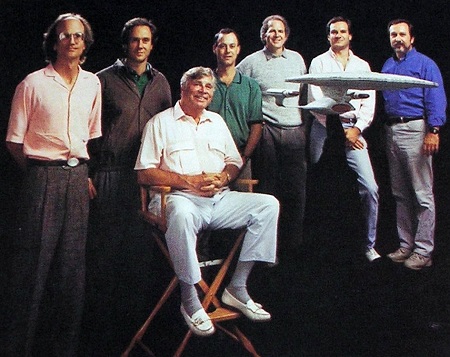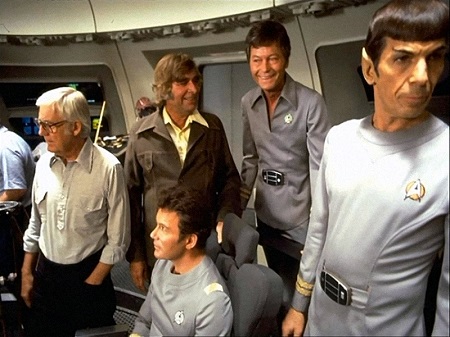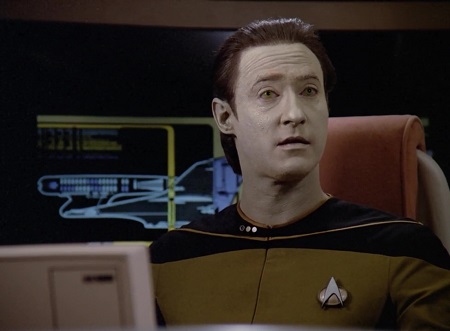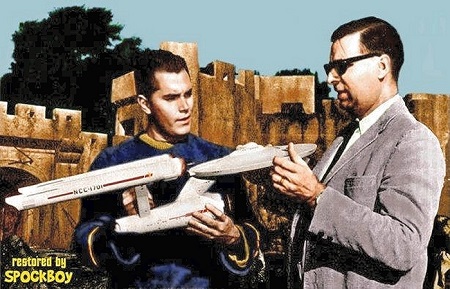Today marks what would’ve been Gene Roddenberry’s 100th birthday, so it’s a good opportunity to pause and look back at the life and legacy of the man who created Star Trek – and changed science fiction forever.
Of course it’s true that we wouldn’t have Star Trek without Gene Roddenberry. But it’s very likely that Star Wars wouldn’t exist either, at least not in any form we’d recognise, and without either of those pioneers, countless other sci-fi and fantasy films and television shows would likely have never made it to the screen. Gene Roddenberry’s legacy extends far beyond the USS Enterprise, Captain Kirk, and the franchise he created that’s still going strong in its fifty-fifth year; he quite literally transformed science fiction and started the process of making it mainstream.
I never had the opportunity to meet Gene Roddenberry. In fact, by the time I settled in to regularly watch Star Trek: The Next Generation in the early 1990s, he’d already passed away. But his creation had a huge influence on my early life and adolescence, even though I only knew the man himself as merely one name among many in the end credits. Many people have spoken about the inspirational side of Star Trek, how the franchise depicts an idealistic future free from many of the problems and challenges our society has to deal with today. For me, that was – and remains – the appeal of Star Trek.

Whole generations of people have grown up watching and loving Star Trek since Gene Roddenberry passed away. The fact that the franchise he created is still inspiring people to look to the stars – and to look to make changes for the better in the world today – a hundred years after he was born, and almost three decades since his death, is a phenomenal legacy for any one person to have. Untold numbers of people have been inspired by Star Trek to become scientists, doctors, engineers, astronauts, and even politicians, taking Gene Roddenberry’s philosophy and idealism for the future to every corner of our society. Star Trek may still be on the air, but Gene Roddenberry’s legacy has long since moved beyond the screen and into the real world.
As someone who never met Gene Roddenberry and only started watching Star Trek after he was already gone, I can’t comment on the man himself. I didn’t know him on a personal level, and I regret never having the opportunity to talk with him about the future and how our society and civilisation might evolve. But I can speak to how I perceive his legacy and how he affected the world, and though it might sound like a cliché, there are very few people who have had such a positive impact – both on my own life and in the wider world.

Star Trek was always double-layered for Gene Roddenberry. There was the cool sci-fi stuff; the spaceships, phasers, transporters, and the like. He brought those to life using the best available television technologies and special effects, some of which would be adopted by other productions and become mainstays of the sci-fi genre. But there was also social commentary and a desire to show audiences that the way the world is today isn’t the way it always has to be.
At a time when racial segregation was still ongoing in the United States, and when the battle for civil rights and racial equality was still being fought, Gene Roddenberry put black and white characters together on an equal footing. At a time when the United States and the Soviet Union were engaged in the Cold War, Gene Roddenberry put a Russian on the bridge of the Enterprise. And at a time when neurodivergent people were looked down on and mistreated, Gene Roddenberry created characters like Spock and Data, who present very differently to their peers but were nevertheless welcomed and accepted.

Gene Roddenberry’s vision of Starfleet and the Federation was a space where everyone could feel welcome. Discrimination and hate didn’t exist in the 23rd or 24th Centuries as he saw it, and the way Star Trek depicted this vision of the future has been a force for good in the world.
On the practical side of things too, Gene Roddenberry’s legacy lives on. George Lucas has said on many occasions that Star Wars – arguably the biggest space-based entertainment property in the world – would not have come to exist without Star Trek and the trail it blazed. Countless other sci-fi and space-fantasy films, television shows, and even video games all owe a great deal to Gene Roddenberry and Star Trek. Though he didn’t invent the genre, Roddenberry expanded it in a big way. By creating one of the first connected fandoms, complete with meet-ups and conventions in which he and the show’s stars would happily participate, Roddenberry pioneered the concept of a fan community decades before the internet came along.

Later today, on what would’ve been Gene Roddenberry’s 100th birthday, a new episode of Star Trek will premiere. What would he have made of Lower Decks, the franchise’s first foray into comedy? Some folks who haven’t liked the direction that the franchise has taken in recent years might say he’d have disliked the concept, but actually Roddenberry had plans for a Star Trek comedy himself. Perhaps the most famous concept would’ve focused on Lwaxana Troi as a spin-off from The Next Generation, but he had many other ideas for Star Trek projects – including comedies – going all the way back to the 1970s.
A number of people involved in the production of Star Trek have noted how Gene Roddenberry was acutely aware of how audience expectations changed over time. One of the main reasons why his television project Star Trek: Phase II was reworked into The Motion Picture was because he’d seen the success of Star Wars in 1977 and how well audiences had responded to it. Though he may not have liked every single creative decision taken by the franchise over the years, he would at the very least understand that audiences have changed and that Star Trek has to change too. Whether he’d approve of every joke and character in Lower Decks or Discovery is thus a moot point; I think Gene Roddenberry would have understood and been supportive of the concept and of taking Star Trek to new places.
So that’s about all I have to say today, really. Though I never met him, Gene Roddenberry has had an ongoing influence on my life. As a Trekkie, I revel in the world that he created, the characters he brought to life, and the wonderfully optimistic vision of a future free from the kind of social ills that plague the world today. I believe, as he did, that the human race is capable of getting to that point. He encouraged all of us to reach for the stars – and to strive to build a better world. That legacy continues to this day – and I hope it will always be there.
The Star Trek franchise – including all properties mentioned above – is the copyright of ViacomCBS. Some behind-the-scenes photos courtesy of TrekCore. This article contains the thoughts and opinions of one person only and is not intended to cause any offence.

